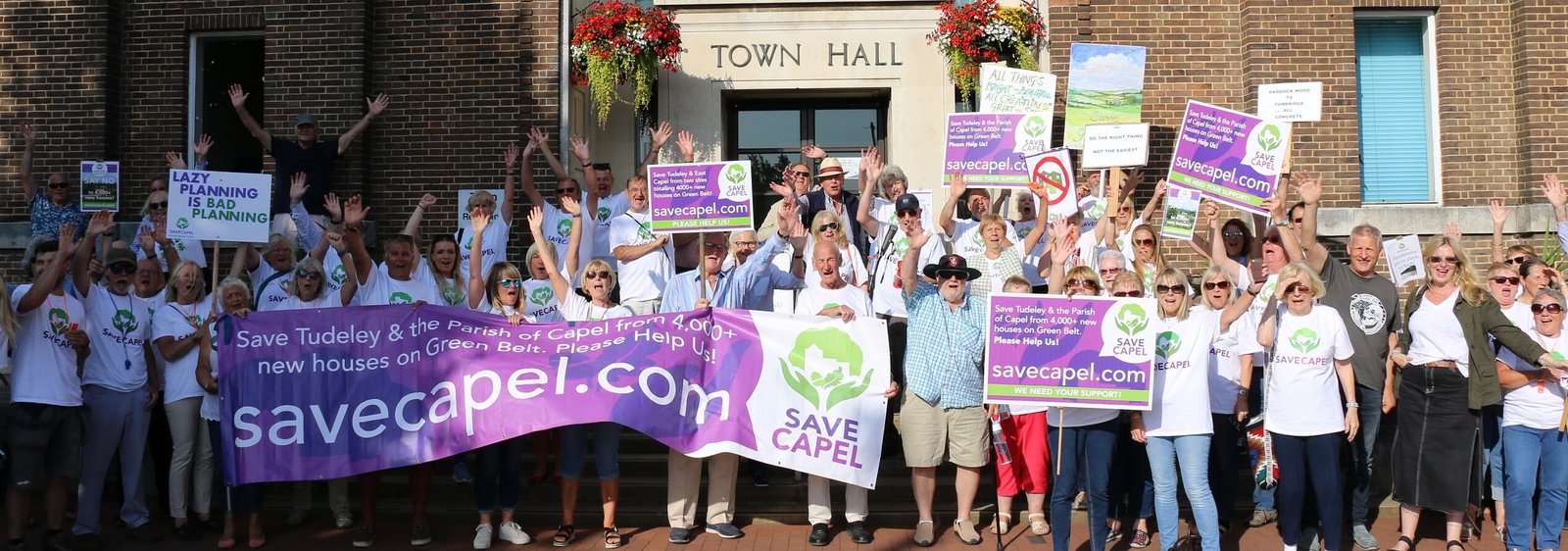Anyone who does not follow politics would have discovered a lot about how the process works at the Full Council meeting on February 3rd. Those who do would have seen a masterclass in manipulation and control of a vote.
We knew what to expect of the vote on whether to take the draft Pre-submission Local Plan to Regulation 19; indeed Cllr McDermott had told Save Capel representatives ‘you will never win’ as far back as summer 2019 and what followed showed he remains as determined.
An early sign of what would follow came when we discovered only four public speakers were being allowed to speak. This was an extraordinary meeting, and therefore the number of speakers was at the discretion of the Chair, Councillor Joy Podbury, and yet despite requests for more slots, the limit of four was kept.
However, Save Capel Chair, Dave Lovell, did speak, alongside representatives from Stop Over Development of Paddock Wood, Benenden & Cranbrook and the Green Party.
Dave started by explaining how the residents of Capel had been consistently ignored. He mentioned 2017 when initial location options were put out for consultation, when we later responded in unprecedented numbers against the plans for Capel at Regulation 18, when the Capel Parish Council asked the community for their view on the plans and when 95% of Save Capel members voted in favour of an alternative at Castle Hill.
“What did we get as a result?” asked Dave, “Capel was slapped with an increase of 700 more houses.”
Dave then went on to highlight several inconsistencies in what had been presented to date: “Openness is also vital to democratic norms, but the justification of these sites is dressed up in convoluted planning-speak and inconsistency. The National Planning Policy Framework says brownfield first, but the plan’s focus is greenfield. The Area of Outstanding Natural Beauty (AONB) and its setting are key, but Tudeley borders the AONB and is intrinsic to the setting between high and low Weald. Flood zones should be avoided, and yet Tudeley, East Capel and Paddock Wood are adjacent to, or in a flood zone. The green belt should be preserved, however, the plan undermines it, creating an urban sprawl from the edge of Tonbridge, merging Tudeley and Five Oak Green with Paddock Wood.”
Dave also challenged a point used by the plan’s supporters against calls to pause and consider alternatives and the impacts of the COVID pandemic. He said: “You are warned developers will run amok if you don’t approve the plan, but the Court of Appeal says otherwise and the Council’s five-year supply is all but met. And there’s the pandemic, dictating the future and accelerating change. But the plan barely acknowledges this. We want a plan for the post-COVID world, not one that has to play catch-up.”
In conclusion Dave asked councillors to vote against the motion to take the plan forward to Regulation 19 consultation and in turn the planning inspector. “We all want a plan that respects public opinion and doesn’t strike fear into residents and neighbours. A plan to regenerate our town centres, that focuses on genuinely affordable housing and close to employment,” he said. “A plan which protects the environment and is not a dead weight around a new Council. Such momentous change needs proper debate, but COVID restrictions make that impossible. Councillors, we ask you to reject the local plan and create a forward-looking plan we can all be proud of.”
Following the public representatives, it was the turn of parish councillors to address the meeting. Hugh Patterson, representing Capel Parish Council gave his presentation, which asked the Council to think again.
And then the choreography began.
Firstly, a representative of Horsmonden Parish Council was brought on to sing the local plan’s praises. Not unsurprising when you realise that Horsmonden Parish falls within the Ward of council leader Alan McDermott.
But the most jaw-dropping of presentations came from the Chair of Tunbridge Wells Forum, Adrian Berendt, who despite not being a parish councillor the Mayor used her discretion to allow to speak. What followed from this could have been written by one of the country’s best PR companies such was the praise given to the plan and the fear of Armageddon it tried to drive into anyone considering voting against it.
With the guests finished, the floor turned to the 46 councillors present.
Possibly the most concerning point to be raised was that as many as 12 councillors that were voting might not have accessed key documents fundamental to demonstrating whether the plan was sound.
The meeting’s chair, Mayor Joy Podbury, initially tried to block Councillor Hayward from speaking, citing an earlier attempt to raise a point of order as his one and only opportunity to speak. However, when this decision was later called into question, the Mayor deferred to the Council’s CEO, William Benson, who in turn asked the Council’s legal representative for clarification on the point. Based on the clarification, Mr Hayward was allowed to speak, and he noted that at 4 pm that day, two and a half hours before the meeting’s start, at least 12 councillors had not yet accessed a secure folder containing documents which were part of the plan.
Access to which had only been given late the day before.
Later in the proceedings, Councillor Pope gave further details, explaining that there were around 40 draft documents in the folder which were not in the public domain, before asking for the vote to be postponed.
It is understood that these documents included key reports from consultants tasked with assessing the overall sustainability of the Tudeley and East Capel proposals, plus the infrastructure requirements for the sites and the details of the master planning which has been carried out on East Capel.
In response to the comments from Councillor Hayward, Head of Planning, Stephen Baughen, said evidence documents including flood modelling reports have been available to members who attended a planning working group, but we know that while all councillors were invited to this group, not all had participated in the meetings. Even for those who had accessed the documents, it was not clear whether this included all the documents in the secure folder. Or, whether they had been able to review current versions of these evolving draft documents.
Many other councillors spoke in support of the plan, some like Paddock Wood Councillor Bailey reiterating comments made in earlier meetings.
Councillor Scott gave his well-rehearsed speech about the forgotten generation, seemingly unaware that Stephen Baughen had already said that Tudeley would become a commuter dormitory. He also referenced the chaos he believed would ensue if we didn’t adopt the plan – again oblivious to the fact that that was simply not the case.
Some councillors did make positive statements we felt represented the situation well. This included Councillor Lidstone who expressed his concern about the imposition on Capel Parish and the issues with incomplete information.
And Councillor Dr Hall suggested we take a pause, citing the missing documents and late delivery of others and the lack of reference to town centre changes due to COVID.
Councillor Neve said the Council should postpone the decision to do more work. He highlighted that no notice was being taken of what Capel Parish Council and its residents were saying and what they want, and recognised that instead, this plan takes the easy option of one landowner. Something Stephen Baughen told residents at a public meeting back in May 2019.
Councillor Backhouse mentioned something championed by the area’s MP, Greg Clark – I before E – or infrastructure before everything else, something not reflected in the plan’s proposals, but then went on to suggest the town centre wards have done their part in the past, and now the rural wards need to step up and do their bit.
And Capel’s Councillor Mackonochie referenced the sheer volume of houses proposed for the Capel Parish claiming it was the wrong numbers in the wrong places.
Then the councillors voted, with 30 voting for, six against and nine abstaining. And as expected the motion was passed, but notable was that a third of those voting did not support the plan being taken to Regulation 19 and in turn the inspector.
In the table below, you can see how each councillor voted. Some votes were contrary to what the councillors said on the night, some were very clear from the outset, and some demonstrated a change in direction. With elections due for many councillors in just a few months, during the consultation period, it’s not a stretch to assume there was some tactical voting at play. And we will never know the true extent of whipping by the Council’s majority party.
As we said at the beginning of this piece, this whole exercise was a clear demonstration of politics in action. But it was certainly not democracy.

How individual councillors voted on Ferbruary 3rd.


